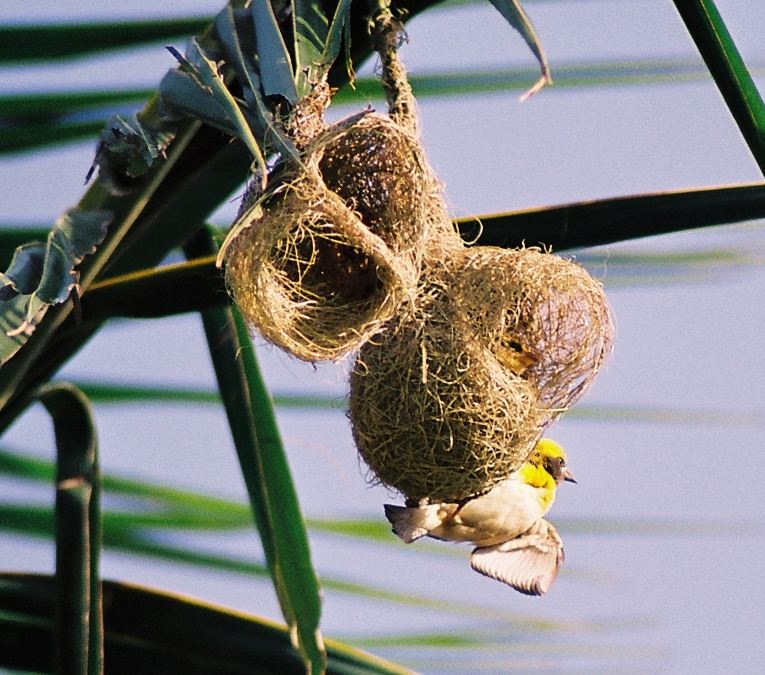|
| 질의: vieillot | 결과: 335번째/337 | |
Weaver (Family: Ploceidae) - Wiki
| 제목: | Weaver (Family: Ploceidae) - Wiki
| |

| 해상도: 765x675
파일크기: 487835 Bytes
등록시간: 2007:12:28 09:21:47
|
Weaver
From Wikipedia, the free encyclopedia
Scientific classification
Kingdom: Animalia
Phylum: Chordata
Class: Aves
Order: Passeriformes
Family: Ploceidae Sundevall, 1836
[Photo] A Baya Weaver, Ploceus philippinus, Male Displaying, See Female in the nest, Picture Taken at Kotaballappalli, Karnataka, India. Date 2006-10-06. Author: Rajeev B (http://commons.wikimedia.org/wiki/User:Rawlife). | Permission is granted to copy, distribute and/or modify this document under the terms of the GNU Free Documentation License, Version 1.2 or any later version published by the Free Software Foundation; with no Invariant Sections, no Front-Cover Texts, and no Back-Cover Texts. A copy of the license is included in the section entitled "GNU Free Documentation License". |
The Weavers are small passerine birds related to the finches.
These are seed-eating birds with rounded conical bills, most of which breed in sub-Saharan Africa, with fewer species in tropical Asia and also in Australia. The weaver group is divided into the buffalo, sparrow, typical, and widow weavers. The males of many species are brightly coloured, usually in red or yellow and black, some species show variation in colour only in the breeding season.
Weaver birds, also known as weaver finches, get their name because of their elaborately woven nests (the most elaborate of any birds'), though some are notable for their selective parasitic nesting habits. The nests vary in size, shape, material used, and construction techniques from species to species. Materials used for building nests include fine leaf-fibers, grass, and twigs. Many species weave very fine nests using thin strands of leaf fiber, though some, like the buffalo-weavers, form massive untidy stick nests in their colonies, which may have several spherical woven nests within. The sparrow weavers of Africa build apartment-house nests, in which 100 to 300 pairs have separate flask-shaped chambers entered by tubes at the bottom. Most species weave nests that have narrow entrances, facing downward.
The weavers are gregarious birds which often breed colonially. The birds build their nests together, often several to a branch. Usually the male birds weave the nests and use them as a form of display to lure prospective females. The weaver bird colonies may be found close to water bodies. They sometimes cause crop damage, notably the Red-billed Quelea, reputed to be the world's most numerous bird.
Species list in taxonomic order
Genus Bubalornis
White-billed Buffalo-weaver, Bubalornis albirostris
Red-billed Buffalo-weaver, Bubalornis niger
Genus Dinemellia
White-headed Buffalo-weaver, Dinemellia dinemelli
Genus Sporopipes
Speckle-fronted Weaver, Sporopipes frontalis
Scaly Weaver, Sporopipes squamifrons
Genus Plocepasser
White-browed Sparrow-weaver, Plocepasser mahali
Chestnut-crowned Sparrow-weaver, Plocepasser superciliosus
Chestnut-backed Sparrow-weaver, Plocepasser rufoscapulatus
Donaldson-Smith's Sparrow-weaver, Plocepasser donaldsoni
Genus Histurgops
Rufous-tailed Weaver, Histurgops ruficauda
Genus Pseudonigrita
Grey-headed Social-weaver, Pseudonigrita arnaudi
Black-capped Social-weaver, Pseudonigrita cabanisi
Genus Philetairus
Social Weaver, Philetairus socius
Genus Ploceus
Black-chinned Weaver, Ploceus nigrimentum
Baglafecht Weaver, Ploceus baglafecht
Bertrand's Weaver, Ploceus bertrandi
Slender-billed Weaver, Ploceus pelzelni
Loango Weaver, Ploceus subpersonatus
Little Weaver, Ploceus luteolus
Lesser Masked-weaver, Ploceus intermedius
Spectacled Weaver, Ploceus ocularis
Black-necked Weaver, Ploceus nigricollis
Black-billed Weaver, Ploceus melanogaster
Strange Weaver, Ploceus alienus
Bocage's Weaver, Ploceus temporalis
Cape Weaver, Ploceus capensis
African Golden-weaver, Ploceus subaureus
Holub's Golden-weaver, Ploceus xanthops
Principe Golden-weaver, Ploceus princeps
Orange Weaver, Ploceus aurantius
Golden Palm Weaver, Ploceus bojeri
Taveta Golden-weaver, Ploceus castaneiceps
Southern Brown-throated Weaver, Ploceus xanthopterus
Northern Brown-throated Weaver, Ploceus castanops
Kilombero Weaver, Ploceus burnieri
Rueppell's Weaver, Ploceus galbula
Heuglin's Masked-weaver, Ploceus heuglini
Northern Masked-weaver, Ploceus taeniopterus
African Masked-weaver, Ploceus velatus
Tanzania Masked-weaver, Ploceus reichardi
Village Weaver, Ploceus cucullatus
Giant Weaver, Ploceus grandis
Speke's Weaver, Ploceus spekei
Fox's Weaver, Ploceus spekeoides
Vieillot's Weaver, Ploceus nigerrimus
Weyns' Weaver, Ploceus weynsi
Clarke's Weaver, Ploceus golandi
Black-headed Weaver, Ploceus melanocephalus
Salvadori's Weaver, Ploceus dichrocephalus
Golden-backed Weaver, Ploceus jacksoni
Cinnamon Weaver, Ploceus badius
Chestnut Weaver, Ploceus rubiginosus
Golden-naped Weaver, Ploceus aureonucha
Yellow-mantled Weaver, Ploceus tricolor
Maxwell's Black Weaver, Ploceus albinucha
Nelicourvi Weaver, Ploceus nelicourvi
Sakalava Weaver, Ploceus sakalava
Streaked Weaver, Ploceus manyar
Baya Weaver, Ploceus philippinus
Asian Golden Weaver, Ploceus hypoxanthus
Yellow Weaver, Ploceus megarhynchus
Bengal Weaver, Ploceus benghalensis
Forest Weaver, Ploceus bicolor
Preuss' Weaver, Ploceus preussi
Yellow-capped Weaver, Ploceus dorsomaculatus
Usambara Weaver, Ploceus nicolli
Olive-headed Weaver, Ploceus olivaceiceps
Brown-capped Weaver, Ploceus insignis
Bar-winged Weaver, Ploceus angolensis
Sao Tome Weaver, Ploceus sanctithomae
Genus Pachyphantes
Compact Weaver, Pachyphantes superciliosus
Genus Malimbus
Yellow-legged Malimbe, Malimbus flavipes
Red-crowned Malimbe, Malimbus coronatus
Black-throated Malimbe, Malimbus cassini
Ballmann's Malimbe, Malimbus ballmanni
Rachel's Malimbe, Malimbus racheliae
Red-vented Malimbe, Malimbus scutatus
Ibadan Malimbe, Malimbus ibadanensis
Red-bellied Malimbe, Malimbus erythrogaster
Gray's Malimbe, Malimbus nitens
Crested Malimbe, Malimbus malimbicus
Red-headed Malimbe, Malimbus rubricollis
Genus Anaplectes
Red-headed Weaver, Anaplectes rubriceps
Genus Brachycope
Bob-tailed Weaver, Brachycope anomala
Genus Quelea
Cardinal Quelea, Quelea cardinalis
Red-headed Quelea, Quelea erythrops
Red-billed Quelea, Quelea quelea
Genus Foudia
Red Fody, Foudia madagascariensis
Red-headed Fody, Foudia eminentissima
Forest Fody, Foudia omissa
Mauritius Fody, Foudia rubra
Seychelles Fody, Foudia sechellarum
Rodrigues Fody, Foudia flavicans
Genus Euplectes
Yellow-crowned Bishop, Euplectes afer
Fire-fronted Bishop, Euplectes diadematus
Black Bishop, Euplectes gierowii
Black-winged Red Bishop, Euplectes hordeaceus
Orange Bishop, Euplectes franciscanus
Northern Red Bishop, Euplectes orix
Zanzibar Bishop, Euplectes nigroventris
Golden-backed Bishop, Euplectes aureus
Yellow Bishop, Euplectes capensis
Fan-tailed Widowbird, Euplectes axillaris
Yellow-shouldered Widowbird, Euplectes macrourus
White-winged Widowbird, Euplectes albonotatus
Red-collared Widowbird, Euplectes ardens
Marsh Widowbird, Euplectes hartlaubi
Buff-shouldered Widowbird, Euplectes psammocromius
Long-tailed Widowbird, Euplectes progne
Jackson's Widowbird, Euplectes jacksoni
Genus Anomalospiza
Cuckoo Finch or Parasitic Weaver, Anomalospiza imberbis - probably belongs in Viduidae
Genus Amblyospiza
Grosbeak Weaver, Amblyospiza albifrons
http://en.wikipedia.org/wiki/Weaver
| The text in this page is based on the copyrighted Wikipedia article shown in above URL. It is used under the GNU Free Documentation License. You may redistribute it, verbatim or modified, providing that you comply with the terms of the GFDL. |
|
^o^
동물그림창고 똑똑전화 누리집
^o^
|
|